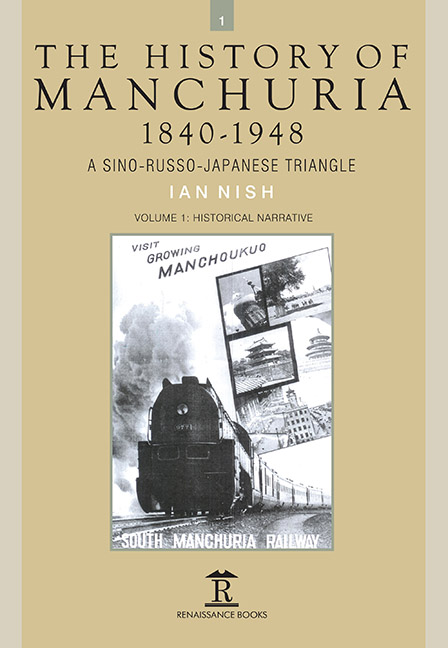Book contents
- Frontmatter
- Dedication
- Contents
- Preface
- Acknowledgements
- Name Conventions
- List of Abbreviations
- List of Maps
- Chapter One Manchuria and Russian Ambition, 1840s–1890s
- Chapter Two Sino-Japanese War and After, 1894–1900
- Chapter Three Prelude to the Russo-Japanese War, 1900–1905
- Chapter Four Railways, Reforms and Revolutions, 1906–1914
- Chapter Five Wartime Turmoil in Manchuria, 1915–1922
- Chapter Six Chang Tso-Lin’s Manchuria, 1922–28
- Chapter Seven Chinese Nationalism and Foreign Railways, 1929–1931
- Chapter Eight Lytton Commission in Manchuria, 1931–1932
- Chapter Nine Manchukuo: From Republic to Empire, 1933–1937
- Chapter Ten A Decade of Wars, 1938–1948
- Epilogue
- Map
- Select Bibliography
- Index
- Volume 2: Select Primary Sources
- Miscellaneous Frontmatter
- Dedication
- Miscellaneous Frontmatter
- Chapter 1 1840–1894
- Chapter 2 1895–1899
- Chapter 3 1900–1905
- Chapter 4 1905–1914
- Chapter 5 1915–1922
- Chapter 6 1922–1928
- Chapter 7 1929–1931
- Chapter 8 1931–1932
- Chapter 9 1933–1937
- Chapter 10 1938–1948
- Apendix Appeal by the Chinese Government
Chapter Six - Chang Tso-Lin’s Manchuria, 1922–28
Published online by Cambridge University Press: 18 November 2023
- Frontmatter
- Dedication
- Contents
- Preface
- Acknowledgements
- Name Conventions
- List of Abbreviations
- List of Maps
- Chapter One Manchuria and Russian Ambition, 1840s–1890s
- Chapter Two Sino-Japanese War and After, 1894–1900
- Chapter Three Prelude to the Russo-Japanese War, 1900–1905
- Chapter Four Railways, Reforms and Revolutions, 1906–1914
- Chapter Five Wartime Turmoil in Manchuria, 1915–1922
- Chapter Six Chang Tso-Lin’s Manchuria, 1922–28
- Chapter Seven Chinese Nationalism and Foreign Railways, 1929–1931
- Chapter Eight Lytton Commission in Manchuria, 1931–1932
- Chapter Nine Manchukuo: From Republic to Empire, 1933–1937
- Chapter Ten A Decade of Wars, 1938–1948
- Epilogue
- Map
- Select Bibliography
- Index
- Volume 2: Select Primary Sources
- Miscellaneous Frontmatter
- Dedication
- Miscellaneous Frontmatter
- Chapter 1 1840–1894
- Chapter 2 1895–1899
- Chapter 3 1900–1905
- Chapter 4 1905–1914
- Chapter 5 1915–1922
- Chapter 6 1922–1928
- Chapter 7 1929–1931
- Chapter 8 1931–1932
- Chapter 9 1933–1937
- Chapter 10 1938–1948
- Apendix Appeal by the Chinese Government
Summary
THE GREATEST CHALLENGE to orderly government in China in the twenties came from the military commanders who felt themselves to be virtually independent. Using their private armies, they plunged the country into almost incessant civil wars. While progressive thinkers in the South wanted to find a formula for unification of the country, the various parties in the North were jealous of one another and frequently came to blows.
These warlords or tuchuns collected the taxes in their provinces primarily in order to fund their armies. If their soldiers failed to receive enough pay, they became armed bandits and lived off the land. It was, therefore, difficult to draw a line between brigands and soldiers. This contributed to the instability of the territory, enhanced by increases in opium cultivation. While several leaders became very wealthy, they had to purchase modern weapons and ammunition at great cost. The European nations, having come out of the war with surplus weapons and aircraft, were over-ready to supply the latest military technology, as was Japan. This was in spite of the ban imposed at the Washington Conference of 1921–1922. The warlords of the Northern clique (hokubatsu) were to remain a force in the area until the death of Chang Tsolin in 1928.
In this chapter I have used the archives of Scottish missionaries whose area of endeavour covered most of Manchuria. They were widely distributed around the country but, for security reasons, kept close to the railway routes or the rivers. As teachers, doctors or ministers of religion, they had direct access to the Chinese people, especially students. They had therefore a broader vision of Chinese society than foreign newspapers or diplomatic archives. But they managed to maintain also remarkably good urban and national contacts. They owed this in part to the high reputation with Chinese leaders of Dr Dugald Christie, the founder of the Mukden Medical Mission who worked for forty years in Manchuria until his retirement in 1924. At the same time it has to be recognized that they had their own ‘constituency’, one part of which was their foreign donors mainly in Scotland who had to be satisfied that the results of their work were positive.
- Type
- Chapter
- Information
- The History of Manchuria, 1840-1948A Sino-Russo-Japanese Triangle, pp. 101 - 122Publisher: Amsterdam University PressPrint publication year: 2016



